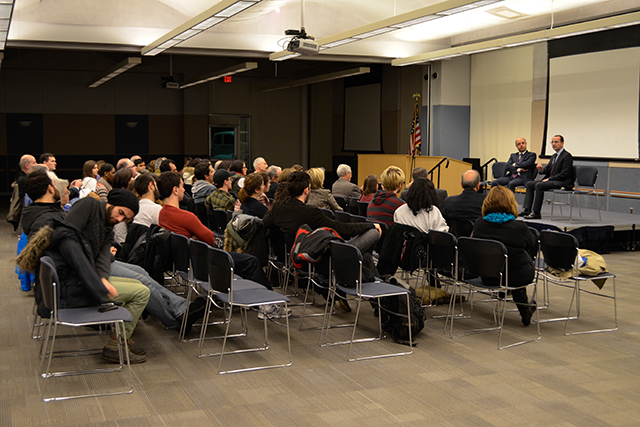
Photo by Nicole Williams
The discussion held between Rev. Dr. Paul Haidostian and Khatchig Mouradian painted a grim picture of education, religion and the overall atmosphere in the Middle East. The talk, entitled “The Scourge of Genocide: A Century of Angst in the Middle East,” took place on Tuesday and was hosted by the Gross Center for Holocaust and Genocide Studies.
Mouradian is the coordinator of the Armenian Genocide Program at the Center for the Study of Genocide and Human Rights at Rutgers University, as well as a professor. He was also formerly the editor of the “Armenian Weekly.” Mouradian prompted the discussion by posing questions to be answered by Haidostian.
Haidostian is the president of Haigazian University in Beirut, and hails from Lebanon, originally. He has written and taught extensively on Armenian identity and Middle Eastern community, among many other topics. His expertise in such matters contributed to the discussion at Ramapo.
“There is no doubt that militarily and ideologically in the Middle East and beyond, the most immediate threat is ISIS,” began Michael Riff, the center’s director, addressing the crowd before introducing Mouradian and Haidostian. “At the same time we cannot ignore that the ancient Christian communities of the Middle East that find themselves in the midst of routine attempts to eliminate their presence in the region.”
To begin, Haidostian talked extensively about education in Lebanon. He spoke of education as an uncertainty in the Middle East compared to America, where it is assumed that children will go to college. Very few have the money to go to college in the Middle East, and the prospect of attaining a job afterwards is not a certainty. The instability of the country further contributes to problems facing higher education.
“I would like to have stability,” said Haidostian of his role as an administrator at Haigazian University. “How can you run a university without stability? And the second thing, you always need a long term vision … in a situation like Lebanon you do not have financial stability, you do not have social stability, certainly political stability, you do not have.”
The conversation then turned to the state of the Armenian people after coming out of the Armenian genocide. Haidostian described Armenians as having a “let’s start again” attitude, wanting to do their jobs well after the genocide. Arabs accepted Armenians as hard working people, but still, 100 years after the genocide, Armenians are still acting upon their survival instincts, and are emotional about their past.
“Armenians emotionally and mentally are not settled,” he explained.
From there, Mouradian steered the conversation towards Christians living in the Middle East. Haidostian described the hard ultimatum Christians are faced with: leave their homes or live in danger, conforming to the rules of oppressors like ISIS.
“It’s unfair. Leaving is unfair, and staying as a third class citizen or abiding by laws you don’t agree with – both are unfair,” he said.
Haidostian feels Christianity has been “distracted” by survival instinct. The foundations of Christianity are based on selflessness and charity, both of which are impossible when one is struggling to survive. He described Christians as waiting to be rescued by western forces. In Haidostian’s opinion, this help will never arrive.
“I’m sad for the theological problems of Christians in the Middle East that I described, but I’m more concerned about the unfounded hopes of the minorities,” he elaborated.
The session closed with a question and answer session, where those in attendance had the chance to question Haidostian on the many topics covered during the discussion. Haidostian’s final thoughts on the matter explained that those in the U.S. and around the world need to look at the problems facing the Middle East through multiple perspectives, to achieve justice that isn’t just convenient for those in power.
“The depth of understanding of the issues is the problem of the world,” he said. “It’s not the lack of options on what to do. It’s the lack of understanding of the situation.”
rking2@ramapo.edu





